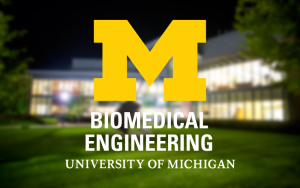Presented By: Biomedical Engineering
Defined Culture Environments Create an Improved Human Intestinal Organoid Model System to Study Intestinal Development
BME PhD Defense: Meghan Capeling

Organoids are small stem cell-derived tissues that mimic some aspects of the structure and function of the organs they are modelled after. Thus, organoids provide a 3D model for studying human development and disease in a complex human-derived in vitro system, and offer advantages over traditionally utilized 2D in vitro cell culture platforms or in vivo animal models. Intestinal organoids have been well characterized and used for over a decade to model intestinal pathologies and advance our understanding of intestinal biology. However, intestinal organoid models have been limited by a reliance on commercial basement membrane extracellular matrix (ECM) products such as Matrigel which introduce experimental variability, limit experimental control, and are unsuitable for downstream clinical applications due to their xenogeneic origin. Additionally, current intestinal organoids are relatively immature and do not contain all of the key cell types found in the human intestine. In particular, a serosal mesothelium, the outermost layer of the intestine that provides a protective boundary for the gut, has not been observed within previous in vitro intestinal models.
In this dissertation, I describe improved culture methods for pluripotent stem cell-derived human intestinal organoids (HIOs) that eliminate reliance on Matrigel and more faithfully recapitulate the organization of the human small intestine. I show that HIOs do not require biochemical support from a 3D ECM matrix as they contain both epithelial and mesenchymal compartments, which enables the formation of a supportive niche within the organoid. Thus, HIOs can be cultured in bioinert environments including unmodified alginate hydrogels and even suspension culture. Alginate and suspension culture provide simple, cost effective culture systems for HIOs that offer increased experimental control and decreased variability compared to Matrigel. I demonstrate that alginate and suspension culture are effective replacements for Matrigel that support the HIO epithelium, as HIOs cultured in alginate and suspension give rise to expected intestinal epithelial cell types.
Additionally, HIOs cultured in bioinert conditions (alginate or suspension) form an organized outer mesenchymal layer that closely resembles the human intestine. Strikingly, HIOs cultured in alginate and suspension form an outer serosal mesothelium that has not been previously observed in Matrigel HIOs. This serosa formation is enhanced in suspension culture compared to alginate. I characterized HIO-serosa to demonstrate that it is molecularly and functionally similar to human intestinal serosal mesothelium. I then utilized suspension HIOs as a model to investigate serosal development and identified roles for HH and WNT signaling in human intestinal serosa formation and patterning. Overall, this work provides improved, defined culture methods for human intestinal organoids that better recapitulate the native intestine for enhanced studies of intestinal development and disease modelling.
Date: Thursday, April 28, 2022
Time: 3:00 PM EST
Location: BSRB Kahn Auditorium
Chair: Professor Jason R. Spence
In this dissertation, I describe improved culture methods for pluripotent stem cell-derived human intestinal organoids (HIOs) that eliminate reliance on Matrigel and more faithfully recapitulate the organization of the human small intestine. I show that HIOs do not require biochemical support from a 3D ECM matrix as they contain both epithelial and mesenchymal compartments, which enables the formation of a supportive niche within the organoid. Thus, HIOs can be cultured in bioinert environments including unmodified alginate hydrogels and even suspension culture. Alginate and suspension culture provide simple, cost effective culture systems for HIOs that offer increased experimental control and decreased variability compared to Matrigel. I demonstrate that alginate and suspension culture are effective replacements for Matrigel that support the HIO epithelium, as HIOs cultured in alginate and suspension give rise to expected intestinal epithelial cell types.
Additionally, HIOs cultured in bioinert conditions (alginate or suspension) form an organized outer mesenchymal layer that closely resembles the human intestine. Strikingly, HIOs cultured in alginate and suspension form an outer serosal mesothelium that has not been previously observed in Matrigel HIOs. This serosa formation is enhanced in suspension culture compared to alginate. I characterized HIO-serosa to demonstrate that it is molecularly and functionally similar to human intestinal serosal mesothelium. I then utilized suspension HIOs as a model to investigate serosal development and identified roles for HH and WNT signaling in human intestinal serosa formation and patterning. Overall, this work provides improved, defined culture methods for human intestinal organoids that better recapitulate the native intestine for enhanced studies of intestinal development and disease modelling.
Date: Thursday, April 28, 2022
Time: 3:00 PM EST
Location: BSRB Kahn Auditorium
Chair: Professor Jason R. Spence